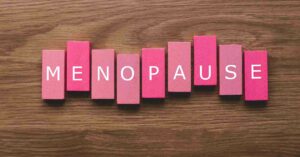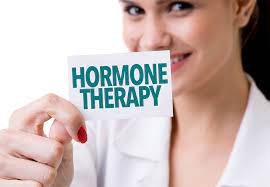If you are a woman who is experiencing menopause and you also have ADHD, you may be feeling overwhelmed and confused. It can be difficult to know which symptoms are related to menopause and which are related to ADHD. In this blog post, we will discuss the relationship between ADHD and menopause, and we will provide advice on how to manage your symptoms.
Contents
Understanding ADHD And Menopause
 ADHD and menopause may seem like two completely different things, but they actually have a lot in common. However, both conditions are different. For one, ADHD is a neurobehavioral disorder that primarily affects children and adolescents, while menopause is a natural biological process that all women go through as they age.
ADHD and menopause may seem like two completely different things, but they actually have a lot in common. However, both conditions are different. For one, ADHD is a neurobehavioral disorder that primarily affects children and adolescents, while menopause is a natural biological process that all women go through as they age.
ADHD is believed to affect mostly males, with a ratio of about 4:1. However, recent studies have shown that the number of girls and women being diagnosed with ADHD is increasing. It’s not entirely clear why this is happening, but it could be due to better awareness and understanding of the condition of girls and women.
On the other hand, menopause is a natural biological process that all women go through as they age. It typically begins around the age of 45 and can last anywhere from a few months to several years. During menopause, the ovaries stop producing eggs, and the levels of the hormones estrogen and progesterone decrease.
Hence, you can understand how different these two conditions are. Let’s further explore the link and similarities between ADHD and menopause.
Can Menopause Look Like ADHD?
While both conditions are different and occur at different times in life, both ADHD and menopause can cause similar symptoms.
- Inattention: Both conditions can make it hard to focus or keep track of thoughts. For menopausal women, this may be due to hot flashes or other hormonal changes. Women with ADHD may have always had difficulty focusing, or may find that their symptoms get worse during menopause.
- Sleep problems: Insomnia is a common symptom of both ADHD and menopause. Women with ADHD may find it hard to fall asleep or stay asleep, and menopausal women may wake up frequently due to hot flashes or night sweats.
- Anxiety: Many women with ADHD struggle with anxiety, and menopause can also cause anxiety due to hormonal changes.
- Depression: Depression is a common symptom of both ADHD and menopause. Women with ADHD may find that their depression gets worse during menopause.
- Memory problems: Both ADHD and menopause can cause memory problems. Menopausal women may have difficulty remembering things due to hot flashes or other hormonal changes. Women with ADHD may have always had difficulty remembering things or may find that their symptoms get worse during menopause.
- Irritability: Both conditions can cause irritability. Menopausal women may be irritable due to hot flashes or other hormonal changes. Women with ADHD may be irritable due to their difficulty focusing or remembering things.
So these are some common symptoms that make menopause look like ADHD. If you feel like you might be experiencing menopause, talk to your doctor. If you have ADHD, talk to your doctor about how you can manage your symptoms during menopause.
How ADHD And Menopause Are Related?
 Though we have discussed the same symptoms of both ADHD and menopause, how are they related? The levels of estrogen play a role in the development and severity of ADHD symptoms. When a woman reaches menopause, her body experiences a drastic drop in estrogen levels. This sudden decrease can worsen existing ADHD symptoms or even trigger new ones.
Though we have discussed the same symptoms of both ADHD and menopause, how are they related? The levels of estrogen play a role in the development and severity of ADHD symptoms. When a woman reaches menopause, her body experiences a drastic drop in estrogen levels. This sudden decrease can worsen existing ADHD symptoms or even trigger new ones.
There is also evidence to suggest that changes in the brain caused by decreased estrogen levels may play a role in the development of ADHD symptoms. One study found that menopausal women with ADHD were more likely to have smaller hippocampus volumes than those without ADHD.
The hippocampus is a part of the brain responsible for memory and learning, so a smaller volume could explain why some menopausal women with ADHD have trouble with forgetfulness and concentration.
Why ADHD Gets Worse During Menopause?
While the exact reason isn’t known, there are a few possible explanations for why ADHD symptoms may worsen during menopause.
- Hormonal fluctuations: Changes in estrogen and progesterone levels during menopause can cause mood swings, anxiety, and irritability — all of which can make ADHD symptoms worse.
- Sleep problems: Hot flashes, night sweats, and other menopause-related sleep issues can make it harder to get a good night’s rest. And lack of sleep can make ADHD symptoms worse.
- Stress: The stress of dealing with menopause itself can worsen ADHD symptoms.
These are very common causes that can increase the symptoms of ADHD in women during menopause. As you can see this can be a very tricky time for women with ADHD. It’s important to be aware of the potential issues and seek help from a professional if needed.
Because of the way ADHD affects women during menopause, it’s important to be proactive about managing your symptoms. Only a professional can give you a diagnosis, but there are some things you can do to help ease your symptoms. So keep reading for some useful tips!
How Does It Impact Life?
 There are a number of ways in which ADHD can impact life, but one of the most significant is the way it can affect relationships. The impulsivity and hyperactivity associated with ADHD can make it difficult to sustain healthy relationships.
There are a number of ways in which ADHD can impact life, but one of the most significant is the way it can affect relationships. The impulsivity and hyperactivity associated with ADHD can make it difficult to sustain healthy relationships.
In addition, there are some negative impacts that both ADHD and menopause can have on health. These include:
- ADHD can lead to lower self-esteem and a negative body image.
- Menopause can increase the risk of heart disease, stroke, and osteoporosis.
Despite these risks, it is important to remember that there are also many positive aspects to both ADHD and menopause. For example:
- ADHD can also lead to higher levels of creativity and energy.
- Menopause can provide relief from the symptoms of premenstrual syndrome (PMS).
If you or someone you know is dealing with ADHD and menopause, it is important to seek out support and resources. Because excessive stress can worsen the symptoms of both conditions, it is important to find ways to manage stress.
How To Treat ADHD And Menopause?
Treatment is necessary in order to keep the symptoms of ADHD and menopause in check. However, there is no one-size-fits-all approach to treatment. The most important thing is to work with a qualified healthcare professional who can help you develop a treatment plan that is tailored to your specific needs.
There are several different types of treatments that can be helpful, some of these are listed below:
Medications
It is common for people with ADHD to be prescribed medications such as stimulants, non-stimulants, or antidepressants. These medications can help to improve focus, concentration, and impulsivity. For example, stimulants such as methylphenidate and amphetamines can be effective in treating the symptoms of ADHD.
- Non-stimulant medications such as atomoxetine and guanfacine can also be helpful. These medications are often used when stimulants are not tolerated or are not effective.
- Antidepressants such as bupropion and venlafaxine can also be used to treat ADHD. These medications can help to improve mood and focus.
Therapy
There are many ways to treat ADHD, but the most common and effective treatment is therapy. Therapy can help you learn how to manage your symptoms and live a more productive life.
There are many different types of therapy, but the most common type of therapy for ADHD is cognitive behavioral therapy (CBT). CBT helps you identify negative thoughts and behaviors and replace them with more positive ones.
Therapy can also help you manage stress and anxiety, which are common symptoms of ADHD. Stress and anxiety can make your symptoms worse, so it’s important to learn how to cope with them.
Hormone therapy
 This is the most common treatment for menopause. It can be given in many forms, including:
This is the most common treatment for menopause. It can be given in many forms, including:
- Pills
- Skin patches
- Gels
- Implants (under the skin)
- Vaginal creams, rings, or tablets
Hormone therapy can relieve menopause symptoms such as hot flashes and night sweats. It can also help with vaginal dryness and pain during sex. There are two types of hormone therapy:
1) Estrogen therapy: This is the most common type of hormone therapy. It can be given alone or with progestin (a synthetic form of progesterone).
2) Progestin therapy: This is sometimes used for women who can’t take estrogen. It can also be given with estrogen to women who have had a hysterectomy (surgery to remove the uterus).
Herbal remedies
There are a number of herbal remedies that have been traditionally used to help with the symptoms of menopause. Black cohosh is one of the most popular and has been shown in some studies to be effective in reducing hot flashes and other menopausal symptoms. Other herbs that have been traditionally used include:
- Dong quai
- Ginseng
- Licorice root
- Red clover
- Soy
If you are interested in trying an herbal remedy, be sure to talk to your doctor first. Some herbs can interact with medications and may not be suitable for everyone.
All in all, these are a few things to keep in mind if you are dealing with ADHD and menopause. Be sure to talk to your doctor about any concerns you have and work together to find the best treatment option for you.
What Are Some Tips For Aging Well With ADHD?
As we age, it becomes more important than ever to take good care of our bodies and minds. For those of us with ADHD, this can be a challenge. Here are some tips for aging well with ADHD:
- Stay active. Exercise is not only good for our physical health, but also for our mental health. It can help to improve focus, concentration, and energy levels.
- Eat a healthy diet. Eating nutritious foods helps to improve overall health and vitality.
- Get enough sleep. Sleep is essential for both physical and mental health. It can help to improve mood, energy levels, and focus.
- Try relaxation techniques. Relaxation techniques such as yoga, meditation, and deep breathing can help to reduce stress levels and improve focus and concentration.
- Take medications as prescribed. If you are taking medication for ADHD, it is important to take it as prescribed by your doctor. This will help to ensure that the medication is effective in managing symptoms.
It is believed that maintaining a healthy lifestyle can help to reduce the symptoms of ADHD. By following these tips, you can age well and live a happy and fulfilling life despite having ADHD. Henceforth, do not let ADHD hold you back from enjoying your life to the fullest.
Conclusion
In a nutshell, ADHD and menopause can be a tricky combination. If you’re dealing with both, it’s important to be as proactive as possible in managing your symptoms. Be sure to work closely with your doctor to develop the best treatment plan for you. And don’t forget to take care of yourself emotionally and mentally, too. With the right support, you can manage both ADHD and menopause successfully.
If you are struggling then please contact Therapy Mantra for help. The team of experts here will be more than happy to help you out and get you on the path to a better life. Contact us today to learn more about our services. You can also book an online therapy session or download our free Android or iOS app.


